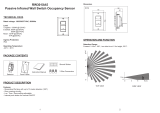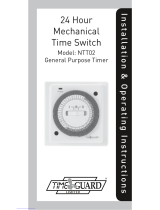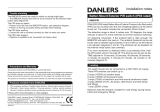Page is loading ...

Installation & Operating Instructions
Surface Mount
IR DALI Presence Detectors
Model: PDSMDALI Surface Mount
IR DALI Presence Detector
Model: PDSMCDALI Surface Mount
IR DALI Corridor Presence Detector

1
1. General Information
These instructions should be read carefully and retained for further reference
and maintenance.
2. Safety
• Before installation or maintenance, ensure the mains supply to the PIR sensor
is switched off and the circuit supply fuses are removed or the circuit breaker
turned off.
• It is recommended that a qualified electrician is consulted or employed
for the installation of this PIR sensor and that it is installed in accordance
with the current IEE wiring and Building Regulations.

2
3. Technical Specifications
General
• 230V AC 50 Hz
• This PIR is of Class ll Construction and must not be earthed
• Detection angle: 360°
• Time ON adjustment: 10 sec, 30 sec, 1 min, 5 min, 10 min,
20 min, 30 min
• LUX Light level adjustment: 10, 100, 500, 1000 Lux
• CONSTANT LUX
level adjustment: Constant light value of 300, 500, 1000 Lux
• STDBY (Standby)
Time adjustment: OFF, 1m, 2m, 5m, 15m, 30m, ON
• Warm up period: 60 seconds
• DALI Group: Select channel 0 to E for grouping 0 to 14 to the
connected load, Channel F = Broadcast
to all the connected load
•Operating Temperature: -20°C to +40°C
• IP20 rated suitable for restricted internal applications
• CE compliant
PDSMDALI
• Motion detection range: Up to a 9m diameter approx.
at a 2.5m mounting height
• Dimensions (W x H x D): 140 x 140 x 51mm
PDSMCDALI
• Motion detection range: Cross walk approx. 40m length.
Straight approx. 16m width.
• Dimensions (W x H x D): 140 x 140 x 65.7mm

3
PDSMCDALIPDSMDALI
4. Selecting a Location
• Careful positioning of the sensor will be required to ensure optimum
performance.
• The best all-around coverage is achieved with the unit mounted
at the optimum height of 2.5 metres.
• The sensor is more sensitive to movement ACROSS its field of vision than to
movement directly TOWARDS it. Therefore position the unit so that the sensor
looks ACROSS the likely approach path.
• Reflective surfaces (i.e. white-painted walls) may cause false activation
under extreme conditions.
• Avoid positioning the sensor where there are any sources of heat in the
detection area (extractor fans, tumble dryer exhausts etc.) including opposite
any other light sources.
• Install the sensor at least 3' away from fluorescent and HVAC ducts,
and at least 4' away from incandescent fixtures and HVAC diffusers.

4
5. Installation
5.1 Ensure the mains supply is switched off and the circuit supply fuses
are removed or the circuit breaker is turned off.
5.2 Make sure the power wiring comes from an external miniature circuit breaker
for short circuit operation.
5.3 Remove the top cover of the sensor by twisting the top cover anti-clockwise,
and then lift off the sensor.
5.4 Remove the back plate from the back of the sensor using the pull tab
labelled ‘open’.
5.5 Mark the position of the mounting holes using the back plate as a template.
Drill the mounting holes taking care to avoid any joists, electrical cables
or water/gas pipes that may be hidden beneath the surface.
Insert the rawl plugs
into the holes.
5.6 Pass the 230V 50Hz mains
supply and load cable through
the cable entry point on the
foam gasket and then the back
plate, ensuring the grommet is
used to maintain the IP rating
of the PIR sensor.
5.7 Secure the foam gasket and back
plate to the ceiling, using the
correct mounting screws for the
rawl plugs installed.
5.8 Terminate the cable into the
terminal block ensuring correct
polarity is observed and that all
bare conductors are sleeved (see
section 6. Connection Diagram).
5.9 It is recommended that the
sensor body is fitted to the
back plate and fixed to
the ceiling as follows;

5
230V 50Hz Mains Supply
Live Supply (Brown or Red) to L
Neutral Supply (Blue or Black) to N
6. Connection Diagram
Connections are as follows;

6
7. Adjustments
• The adjustments can be found beneath the top cover of the sensor. Check that
the sensor is set to factory defaults, with the adjustments set as follows;
TIME ON setting: 10 seconds
CONSTANT LUX setting: 1000 Lux
STDBY TIME: OFF
DALI Group: F
•LUX: Used to set the threshold light level to activate the sensor when
it changes from day to night.
•CONSTANT LUX: At the selected threshold light level the sensor will be
activated. The sensor will automatically regulate the load to keep the light level
at the selected threshold until it moves from day and over the threshold.
•TIME: Used to select the desired time ON delay for when the sensor
is activated.
•STDBY (Standby) TIME: Used to select the time delay for standby
(fixed at 20% of the brightness of the load).
•DALI Group: Used to select the channel 0 to E for grouping 0-14 of the
connected load, or Channel F to broadcast to all of the connected loads.
•Push Button Function (S Terminal): An external push button can be
installed for manual light control (see section 6. Connection Diagram).
Press the button once to turn the load ON, the time ON delay will be adjusting
to the TIME adjustment. Press the button once again to turn the load OFF, the
time OFF delay will also activate according to the TIME adjustment. Hold the
button down to dim (up or down) the load, and release the button and the
current brightness value will be retained. Hold the button down a second time
to dim the load the reverse way.

7
8. Initial Set-up and Operation
• Switch the power to the detector on, the sensor LED indicator and load
will turn ON for a warm-up period of approximately 60 seconds.
• Once the warm-up period is complete, walk in front of the
detector until the load turns ON. This checks the operation of the
detector and field of view.
• When in Test Mode (when using the Timeguard IRRDALI remote control), the
sensor LED indicator and load will turn ON for 3 seconds when each movement
is detected. Without the IRRDALI remote control, the sensor LED indicator will
turn on the load for the duration as set on the TIME setting
(minimum is 10 seconds).
• Walk around the sensor to establish the detection area.
• Turn the TIME and LUX control settings to the desired positions.
• The detector is now in Auto Mode and will operate according to the pre-set
TIME and LUX light level adjustments. Once activated, the sensor
LED indicator and load will remain ON until it times out.

8
9. Lens Mask
• The supplied lens mask can be used to reduce the sensor coverage, preventing
detection in unwanted areas.
• Cut the lens mask either horizontally or vertically until the desired area of
detection is obtained.
• For your information, the centre section of the lens mask covers short range
detection, and the outer edge of the lens mask covers long range.
• Push the lens mask into the slot around the sensor head. The position can be
adjusted by sliding it around the slot as follows;
PDFMCDALI
PDFMDALI

9
10. Troubleshooting
Problem
The sensor will not
function at all/Load
will not come ON
Solution
Check the wiring to make sure that you have the correct
AC power and DALI power at the sensor.
Check the wiring from the sensor to the source of power
to make sure you have wired the sensor correctly.
Check the LUX adjustment to see if it is set at your
desired level.
Detector clicks but
does not work
Check the load is operational.
Load goes ON
and OFF too quickly
Ensure light and heat are not being deflected onto the
detector. Check for white or reflective surfaces that may
be causing the problem.
Note the detector is more sensitive in cold weather.
Make sure the sensor isn’t installed close to an
air conditioner.
Load stays ON Check the wiring to ensure the load isn’t wired directly
to the supply.
Adjust the time to minimum, and ensure the sensor is
firmly fixed to a fixed solid object with no moving objects
in the field of view.
Ensure the detector is not being activated by stray
moving heat sources such as heating outlets.

10
3 Year Guarantee
In the unlikely event of this product becoming faulty due to defective material or
manufacture within 3 years of the date of purchase, please return it to your supplier
in the first year with proof of purchase and it will be replaced free of charge.
For years 2 and 3 or any difficulty in the first year, telephone the helpline
on 020 8450 0515.
Note: A proof of purchase is required in all cases. For all eligible replacements (where
agreed by Timeguard) the customer is responsible for all shipping/postage charges
outside of the UK. All shipping costs are to be paid in advance before a replacement
is sent.

Zerofour – June 2018
67.058.631 (Issue 1)
Timeguard Limited.
Victory Park, 400 Edgware Road,
London NW2 6ND
Sales Office: 020 8452 1112
or email csc@timeguard.com
For a product brochure please contact:
If you experience problems, do not immediately return the unit
to the store. Telephone the Timeguard Customer Helpline:
Qualified Customer Support Coordinators will be online
to assist in resolving your query.
HELPLINE
020 8450 0515
or email helpline@timeguard.com
www.timeguard.com
/




